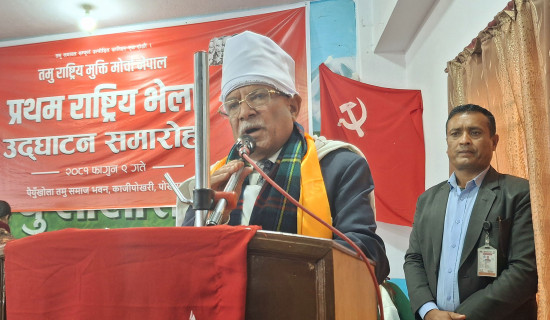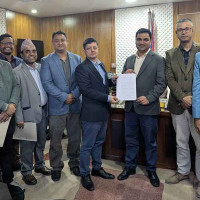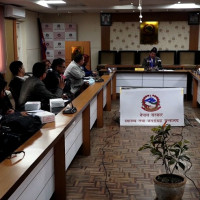- Saturday, 22 February 2025
A village disappears due to Chure destruction
By Vijay Kumar Sah,Dhalkevar, Feb. 21: Chhirpokhari village, once a thriving and self-sufficient settlement in Dhanusha district, no longer exists. Once home to nearly a hundred households, sustained by agriculture and natural water sources, has now turned into a barren wasteland.
In the last week of July 1987, a devastating flood in the Jalad River wiped out the entire village. The river, which had been eroding land every year, ultimately submerged the settlement. Today, only two cement-lined wells remain as the last remnants of Chhirpokhari’s existence.
Raj Kishor Yadav, who was a teenager when the flood struck, recalls the terrifying day. “It had been raining since morning. The river’s course changed and the land near our homes started eroding. I was newly married and my younger siblings were small. As the flood destroyed our village, we tried to salvage wooden beams and bamboo from our homes. We carried some clothes and grains to the fields, but most of our rice and food supplies were buried in the mud,” he recalled.
Another displaced villager, Ram Ekbal Mahato, talked about the life they lost. “People from different communities – hill people, Chamar, Koiri, Yadav -- lived in harmony, farming together. But on that fateful night, we lost everything, he said. Lalit Bahadur Budhathoki, 70, still visits the barren land where Chhirpokhari once stood, walking nearly an hour to reach the site. “Everything disappeared before our eyes. It was not just me, every family in the village was affected,” he said.
According to Budhathoki, the Jalad River used to flow straight in the early 1980s. But over time, it meandered, eroding the land and in 1987, it engulfed the entire village. Farmers who once cultivated fields in Chhirpokhari became landless overnight.
After being displaced, the villagers relocated about two kilometres away to higher ground. The new settlement, now known as Sakhua Bazaar in Ward No. 6 of Chhireshwarnath Municipality, has around 65 families from Chhirpokhari along with over 150 other households.
Standing beside one of the old wells, Budhathoki explained, “This well was at the same level as the village. Now, it stands alone in the middle of a wasteland. The river’s width has expanded from 400 metres to over a kilometre.”
The crisis rooted in Chure destruction, Chhirpokhari’s history dates back about 200 years when Tharu communities first settled in the area and later joined by other groups. The destruction of the village is now seen as an early warning of the larger environmental crisis that Chure deforestation could invite.
Som Prasad Sharma, President of the Federation of Community Forest Users’ Group in Madhes Province, said, “The loss of trees, shrubs and organic cover in the Chure region has disrupted water absorption.
Rainwater no longer seeps into the ground, leading to excessive surface runoff. Sediments like sand, gravel and stones pile up in rivers, intensifying floods and altering their course.”
He warned that similar destruction continues today, with people exploiting the Chure hills for resources despite repeated disasters.
Provincial Assembly Member Ram Ashish Yadav echoes the urgency of Chure conservation. “This is not a political issue, it is a fight for survival. If the Chure is not protected, Madhes will suffer first, and its agrarian economy will collapse. Federal, provincial and local governments must prioritise scientific conservation efforts, he said.
Yadav also called for stricter laws to curb land encroachment, uncontrolled settlements and illegal logging in the Chure region. He urged the government to revoke policies that encourage environmental exploitation under the guise of land distribution.
Over the past three decades, the Jalad River has changed its course three times. While embankments have been built to prevent erosion, they have failed to provide a lasting solution. Environmental expert Vijay Kumar Singh highlighted the disproportionate impact of deforestation, saying, “Conservation efforts are minimal compared to the scale of destruction. Due to deforestation, the soil in the Bhabar region can no longer absorb water, leading to increased sand deposits in Madhes’s farmlands.”
Unless urgent conservation measures are taken, Singh warned, many other villages could suffer the same fate as Chhirpokhari, gradually turning them into barren wastelands.




-square-thumb.jpg)


-square-thumb.jpg)









